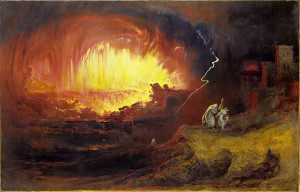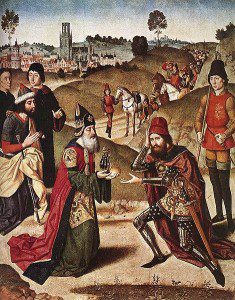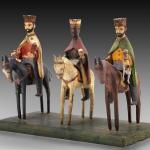 The destruction of Sodom and Gomorrah, a story used extensively in Scripture and in Jewish and Christian writing as an example of judgment. But what is the sin under judgment?
The destruction of Sodom and Gomorrah, a story used extensively in Scripture and in Jewish and Christian writing as an example of judgment. But what is the sin under judgment?
We are in the midst of a slow meander through Genesis, using the commentaries by John Walton (The NIV Application Commentary Genesis), Tremper Longman (Genesis in the Story of God Bible Commentary), and Bill Arnold (Genesis (New Cambridge Bible Commentary)) as guides. Abra(ha)m’s nephew Lot, a minor character to this point, plays a more central role in Genesis 13-14 and 18-19 after which he disappears from the narrative. Bill Arnold points out that until the birth of Ishmael, Lot is Abra(ha)m’s heir presumptive, the closest male relative. As such he is a significant member of the family. Both Abram and Lot have grown rich in Egypt and Canaan. So rich, with herds so numerous, that they need to separate to avoid strife. Abram according to custom offers Lot a choice of location and Lot (surprisingly) chooses. A more typical pattern would have involved multiple deferrals (see for example Abraham’s purchase of a burial spot for Sarah in chapter 23). Lot chooses what looked best to him, moves into the valley and settles near Sodom, a city of wickedness.
 Twice following Lot’s choice Abraham has to intercede for him. In the first incident he leads a rescue after a raiding party takes off Lot among other spoils from Sodom and Gomorrah. It is not possible to place the names of the kings and the places mentioned into the known history of the area (not complete by any means), but the story has a ring of authenticity. It was edited at a later date (the reference to Dan in v. 14 makes this clear, as Dan was not named until the days of the Judges after Moses and Joshua) but has roots much older. The story also serves to introduce the enigmatic Melchizedek, king of Salem and priest of God Most High. Of note, after the rescue Abram refuses to accept any of the booty himself, leaving it for his allies or returning it to the king of Sodom.
Twice following Lot’s choice Abraham has to intercede for him. In the first incident he leads a rescue after a raiding party takes off Lot among other spoils from Sodom and Gomorrah. It is not possible to place the names of the kings and the places mentioned into the known history of the area (not complete by any means), but the story has a ring of authenticity. It was edited at a later date (the reference to Dan in v. 14 makes this clear, as Dan was not named until the days of the Judges after Moses and Joshua) but has roots much older. The story also serves to introduce the enigmatic Melchizedek, king of Salem and priest of God Most High. Of note, after the rescue Abram refuses to accept any of the booty himself, leaving it for his allies or returning it to the king of Sodom.
The second incident involves the famous story of the destruction of Sodom. Abraham intercedes with the Lord for Sodom, asking him to spare it for fifty, forty-five, forty, thirty, twenty, and finally ten righteous among the inhabitants of the city. The Lord agrees, but the city lacks even ten who are righteous. Lot and his family alone are offered rescue, with only Lot and his daughters making it to safety.
This leads to a question. What was the sin of Sodom and why did it stand out among all of the other cities of the region? Hint, it isn’t homosexuality per se, although violent sexual aggression certainly stands as an example of their sin. This is a blatant disregard of hospitality laws. The strangers are to be preyed upon and used not housed and protected. No city of refuge this. Tremper Longman points out “we are not talking about consensual sex in this story, but rather rape, and gang rape at that.” (p. 247) This isn’t about sexual desires but about power and dominance, “the desire of the men of the city to have sex with the visiting men was almost certainly not because the former were gay themselves. Rather, it was a way of exerting power over these visiting foreigners.” (p. 239)
It is also important to note that Scripture does not single out homosexuality as the sin of Sodom. Longman cites Ezekiel 16:49-50 “Behold, this was the guilt of your sister Sodom: she and her daughters had pride, excess of food, and prosperous ease, but did not aid the poor and needy. They were haughty and did an abomination before me.” and the references in Matthew 10 and Luke 10 when Jesus sends out his disciples as examples indicating that the primary offense was a lack of hospitality for the traveler and care for the poor and needy.
A final point in favor of this interpretation is the opening with Abraham in 18:20-21. Then the Lord said, “Because the outcry against Sodom and Gomorrah is great and their sin is very grave, I will go down to see whether they have done altogether according to the outcry that has come to me. And if not, I will know.” The implication is that the victims of Sodom have cried out to God for deliverance.
The wickedness of Sodom is made crystal clear in the narrative, 19:4-11.
But before they lay down, the men of the city, the men of Sodom, both young and old, all the people to the last man, surrounded the house. And they called to Lot, “Where are the men who came to you tonight? Bring them out to us, that we may know them.” Lot went out to the men at the entrance, shut the door after him, and said, “I beg you, my brothers, do not act so wickedly. Behold, I have two daughters who have not known any man. Let me bring them out to you, and do to them as you please. Only do nothing to these men, for they have come under the shelter of my roof.” But they said, “Stand back!” And they said, “This fellow came to sojourn, and he has become the judge! Now we will deal worse with you than with them.” Then they pressed hard against the man Lot, and drew near to break the door down. But the men reached out their hands and brought Lot into the house with them and shut the door. And they struck with blindness the men who were at the entrance of the house, both small and great, so that they wore themselves out groping for the door.
This wasn’t a one time occurrence. Lot offered protection to the men and insisted that they come into his house rather than remain in the square. The implication is that he knew the habits of the people of Sodom. The two would not be safe in the public spaces of the city. No one who heard or read this story would excuse, or feel sorry for, the men of Sodom.
John Walton points out that the specification “all the people to the last man” is probably hyperbolic. There is no indication, for example, that Lot’s intended sons-in-law were there. However, the text indicates widespread participation. The wicked behavior isn’t an aberration limited to a few. The corruption penetrates the entire society.
Both Bill Arnold and Tremper Longman see Lot’s response as righteous in protecting the visitors, but despicable in offering up his daughters in their place. John Walton suggests that there may be another interpretation.
Is Lot truly offering his daughters to be gang-raped and probably murdered? An alternative is that his suggestion implies a more subtle, “I would as soon have you violate my family members as violate those whom I have taken in and offered hospitality!” It would be like sarcastically saying to your mortgage company, “Why don’t you just take the clothes off my children’s backs and the food off their plates.” Such a comment in not suggesting that they will really do that. If this is the correct way to read verse 8, Lot’s offer of his daughters is intended to prick the conscience of the mob. (p. 477)
This may be the correct reading of the passage. One cannot really imagine Lot sending his daughters, engaged to be married, his hope for the future, out to the mob. In any event, the wicked intent of the mob is not dissipated or diverted and the visitors, angels, must come to the rescue. There are not even ten who are righteous. Sodom is destroyed in a rain of burning sulfur.
An interesting interlude in the ancestral narrative of Abraham. God will judge those who fail to live by his commandments. He has told you, O man, what is good; and what does the Lord require of you but to do justice, and to love kindness, and to walk humbly with your God? Sodom failed miserably and God brought judgment, as the prophets also proclaimed judgment against Israel for similar sins.
What are we to take from this incident with Lot in Sodom?
If you wish to contact me directly you may do so at rjs4mail[at]att.net.
If interested you can subscribe to a full text feed of my posts at Musings on Science and Theology.
Added: A number of commenters have noted that Jude 7 seems to be ignored. Longman brings up Jude 7 in his commentary and lists other references to Sodom and Gomorrah as example of judgment, especially in Isaiah. Jude verse 7 is the one passage in all of scripture that singles out the sexual nature of the sin of Sodom, but it is still not a given that homosexuality per se is the focus. Some have argued that the “other flesh” here is the flesh of angels.
There is no doubt that violent sexual aggression is involved in the sin of Sodom. I find the passage in Judges 19 helpful in understanding this passage in Genesis 19. In Judges we have a Levite and his concubine not safe in the town square. The wicked Benjamites come to the house of the man who gives them shelter and demand the man to “know him.” In this case they take the concubine instead and murder her through a night of sexual violence. It isn’t homosexuality per se that is at the center. It is violent aggression and perverse exploitative desires of the flesh. In the story of Lot and Sodom the angels of God save Lot and his daughters.
The focus is on active, violent aggression, an active opposite of hospitality. Violent sexual dominance and perversion is in the mix. However, Longman argues, and I agree, that the focus is not specifically homosexuality.















